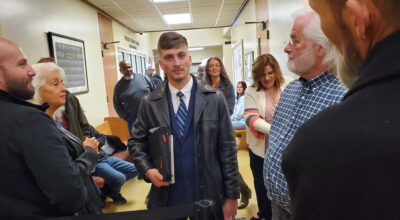
Austin Garrett, sheriff of Hamilton County, runs a general warrants scheme and imposes the state trucking law on nontruckers. (Photo HCSO)
CHATTANOOGA, Tenn., Thursday, Jan. 18, 2024 — My case insisting a criminal prosecution over my license and a damaged taillight be heard in the state capitol is going to the Hamilton County grand jury.
By David Tulis / NoogaRadio Network
Christine Sell, sessions court judge, hands me the documents to ink my name 4x on two criminal misdemeanor packets waiving the “right to a preliminary hearing” and the right to have an attorney after I object to her proposal for a second hearing on grounds of no subject matter jurisdiction. That will give Jason DeMastis, the assistant DA charged with my case, a chance to pursue the case, or simply pitch it. That’s likely what DA Coty Wamp will direct, knowing a jury trial is no threat to me, and knowing that traffic cases like mine are not serving the public interest nor in line with her political acumen to prosecute real crime.
“I am here in a special appearance because I am challenging the jurisdiction of the court,” I say, “both subject matter jurisdiction and in personam jurisdiction.”
She says the hearing today does not involve the officer, and perhaps I want to hear the state’s case at another hearing.
“I object to any further hearing,” I tell the judge. “This court has no subject matter jurisdiction, and doesn’t have any authority to deal with this matter — it cannot enter into any of the merits of the state’s case but can only hold this case from the outside, as it were, and dismiss it ministerially,” I say, “as it lacks authority to hear a matter that is administrative in nature.”
The ADA sits with a colleague at his table, silent.
I explain that since the two charges are under Title 55, pertaining to a state privilege and license, the matter over my damaged RAV4 taillight is due to be heard in the administrative agency, especially “since I am asserting the right in my defense against the state of Tennessee to have it exhaust its administrative remedies in a contested case hearing at Foster Ave. in Nashville.”
I cite the Tennessee uniform administrative procedures act in Title 4, chapter 5. A brief in her hand shows that matters touching on a license are civil, under administrative law, citing McMinnville Freight Line, Inc. v. Atkins, 514 S.W.2d 725, 726–27 (Tenn. 1974), “[T]he grant or refusal of a license to use public highways in commerce is purely an administrative question.”
She says she is sitting in the place of sessions judge Alex McVeigh, and has not read my 17pp affidavit and pre-plea remedy and avoidance. She suggests she doesn’t want to step on his toes if he has read the pre-plea remedy filing and has a plan for the case.
She also had in the packet my two-page draft order to dismiss, taking account of my analysis. I had filed it with the clerk on the floor below before going to the court.
“You need to prepare a grand jury packet, sent to the foreman of the grand jury, and say, ‘This is unripe, this is why the court doesn’t have jurisdiction on it, , and this is why it’s not ripe for the grand jury to hear either,” says Christopher Sapp, midstate bureau chief. “I would send a certified copy to [safety] commissioner Long, the state attorney general, and the district attorney general, as well as the grand jury foreman.
Judge Sell denies my right to record my hearing without citing the law at T.C.A.20-9-104, which says “[i]t is lawful for attorneys representing parties in proceedings in any of the courts of this state to use tape recorders as an aid in making notes of the proceedings.”


nice (adj.)
Origin and meaning of nice
late 13c., “foolish, ignorant, frivolous, senseless,” from Old French nice (12c.) “careless, clumsy; weak; poor, needy; simple, stupid, silly, foolish,” from Latin nescius “ignorant, unaware,” literally “not-knowing,” from ne- “not” (from PIE root *ne- “not”) + stem of scire “to know” (see science). “The sense development has been extraordinary, even for an adj.” [Weekley] — from “timid, faint-hearted” (pre-1300); to “fussy, fastidious” (late 14c.); to “dainty, delicate” (c. 1400); to “precise, careful” (1500s, preserved in such terms as a nice distinction and nice and early); to “agreeable, delightful” (1769); to “kind, thoughtful” (1830).
rape (v.)
late 14c., rapen, “seize prey; abduct, take and carry off by force,” from rape (n.) and from Anglo-French raper (Old French rapir) “to seize, abduct,” a legal term, probably from Latin rapere “seize, carry off by force, abduct” (see rapid). Also figuring in alliterative or rhyming phrases, such as rape and renne (late 14c.) “seize and plunder.”
The older senses of the English word became obsolete. The surviving meaning “to abduct (a woman), ravish;” also “seduce (a man)” is clearly by early 15c. in English, but it might have been at least part of the sense in earlier uses.
Meaning “to rob, strip, plunder” (a place) is from 1721, a partial revival of the old sense. Uncertain connection to Low German and Dutch rapen in the same sense. In Middle English, and occasionally after, the verb was used in figurative senses of Latin rapere, such as “transport in ecstasy, carry off to heaven,” usually in past-participle rapte, which tends to blend with rapt. Related: Raped; raping.
Classical Latin rapere was used for “sexually violate,” but only rarely; the usual Latin word being stuprare “to defile, ravish, violate,” which is related to stuprum (n.) “illicit sexual intercourse,” literally “disgrace,” stupere “to be stunned, stupefied” (see stupid). Latin raptus, past participle of rapere, used as a noun meant “a seizure, plundering, abduction,” but in Medieval Latin also “forcible violation.”
Really? As many times as I have taken you to court with me, so that maybe you could learn that a corporation (man made/piece of paper) has no Lawful jurisdiction/authority with regard to Living beings (natural, under God).
Who or what do you think the corporation (a piece of paper) is administrating in the first place? IT can only administrate another piece of paper, not People.
The so-called judge actually destroys the already VOID case of the piece of paper, by recognizing that you have rights (only People have rights) by coercing you to waive them, which you jump to do, as if you are a piece of paper, having none.
Because then the mighty corporation (piece of paper) will allow you to make like Clarence Darrow for a few minutes, while it administrates you, as a piece of paper.
The state piece of paper has no case, and IT continues to hand you one, that you are apparently afraid to prosecute, under your own Lawful authority as a man, and one of the People of Tennessee. Duly recognized by the administrative, so-called court.
Jon, perhaps you misunderstand. The administrative court has no authority to hear the case whatsoever, whether or not I am a licensee, because it has no subject matter jurisdiction because on Nov. 22, as I am traveling on private business in enjoyment of ingress and egress rights, I am not “on” the license, as rarely I am. The case is a misfire no matter how I look at it. Only, here, I want to nail the tongue of the good people to the table.